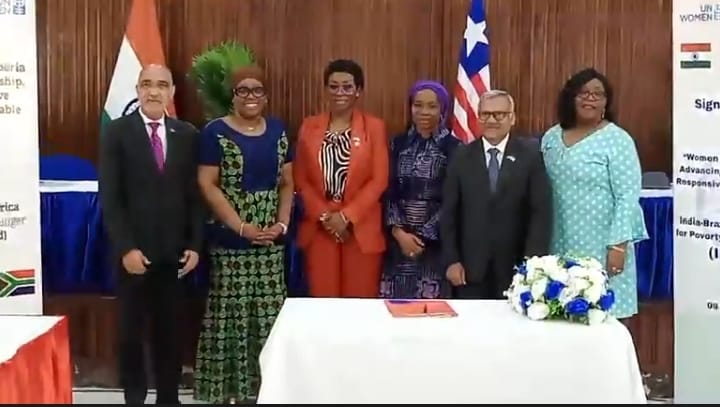The Women’s Legislative Caucus of Liberia (WLCL), with crucial backing from the India, Brazil, and South Africa Facility for Poverty and Hunger Alleviation (IBSA Fund) and coordination from the UN Office for South-South Cooperation, has embarked on an ambitious USD 1 million project aimed at bolstering women’s leadership and governance across eight Liberian counties. This 18-month initiative, titled “Women Legislators in Liberia: Promoting Voice, Leadership, and Gender Responsive Governance,” signifies a significant investment in empowering women within Liberia’s political landscape. The project’s core objective is to enhance the capacity of WLCL members, legislative committees, and staff in critical areas such as gender-responsive lawmaking, oversight, budgeting, and effective constituency outreach. The project’s reach extends to Bong, Gbarpolu, Grand Cape Mount, Grand Bassa, Grand Gedeh, Lofa, Margibi, and Montserrado counties, ensuring a broad impact across diverse regions.
Central to the project’s strategy is the provision of targeted technical support to women legislators. This includes assistance in drafting legislative bills, preparing informative briefs, and compiling comprehensive hearing notes. Furthermore, the project facilitates valuable South-South exchange programs, connecting Liberian women legislators with their counterparts in India and South Africa, fostering cross-cultural learning and the sharing of best practices. Beyond strengthening legislative skills, the initiative addresses the broader socio-economic context impacting women’s leadership. It incorporates integrated interventions focusing on adult literacy, digital and financial literacy, entrepreneurship development, and strengthening value chains within the agricultural sector. These efforts aim to empower women economically, providing them with the tools and resources to become active agents of change within their communities.
The project’s comprehensive approach recognizes the multifaceted challenges hindering women’s political participation in Liberia. It seeks to shift prevailing narratives through strategic community engagement, forging partnerships with media outlets, disseminating insightful policy briefs, and fostering collaboration with civil society organizations. This multi-pronged approach aims to create a more conducive environment for women’s leadership to flourish. The project also emphasizes strengthening existing community-based financial institutions such as Village Savings and Loan Associations (VSLAs) and women’s cooperatives, providing crucial access to financial resources and promoting economic self-reliance. A key component of the project is a legislative internship program, designed to provide young women with invaluable hands-on experience working alongside WLCL members and committees. This program aims to nurture the next generation of women leaders, equipping them with the skills and knowledge necessary to navigate the complexities of the political landscape.
Senator Dabah Varpilah of Grand Cape Mount County eloquently articulated the persistent barriers confronting women’s leadership in Liberia. She highlighted the impact of restrictive social norms, the prohibitive costs associated with political campaigns, the safety risks women face in the political arena, and the limited access women often have to essential networks, skills development opportunities, and financial resources. Senator Varpilah underscored the importance of consistently applying gender analysis in lawmaking and budgeting processes, emphasizing the timeliness and relevance of the project’s interventions. The project’s launch was met with enthusiastic support from UN Women Liberia Representative Comfort Lamptey, who commended the WLCL for their vision and leadership. She emphasized the global significance of women’s parliamentary caucuses as powerful engines of change, highlighting their crucial role in advancing gender equality and women’s empowerment.
Lamptey acknowledged the persistent underrepresentation of women in leadership positions in Liberia, noting that women hold only about 11 percent of legislative seats and 35 percent of ministerial positions. She stressed the urgent need to address the lack of economic opportunities for women and the pervasive violence that continues to deny women and girls their fundamental rights. Lamptey described the project as a transformative tool, empowering the Caucus, extending its reach into communities, and ensuring that advocacy efforts are effectively reflected in laws, policies, and budgets. She also acknowledged the vital support provided by the European Union, Sweden, Ireland, UNDP, and the IBSA Fund, recognizing the strong coalition that has formed around the cause of women’s leadership and empowerment in Liberia. Lamptey reaffirmed UN Women’s commitment to supporting the WLCL in this important journey, emphasizing that the true measure of success will be the tangible improvements in the lives of Liberian women.
The project’s ultimate aim is to create a Liberia where women have greater political participation, stronger protections against violence, and more economic opportunities. By focusing on capacity building, legislative reform, economic empowerment, and community engagement, this comprehensive initiative seeks to create a lasting impact on the lives of Liberian women and contribute to a more equitable and inclusive society. The collaborative nature of the project, involving international partners, government agencies, and civil society organizations, underscores the widespread recognition of the importance of investing in women’s leadership and empowering them to become active participants in shaping Liberia’s future. The project’s success will not only benefit individual women but will also contribute to strengthening democratic governance and promoting sustainable development in Liberia.


